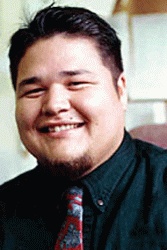|
 |
| Brad Angasan |
 |
Born: January 2, 1972, in South Naknek, Alaska
Parents/Relatives: Trefon Angasan and Sally Catherine Nielsen
Place of residence: Dillingham, Alaska
Native Heritage: Sug’piaq Aleut
Schooling: Attended Western State College in Colorado, graduated from Alaska Department of Public Safety Academy in Sitka in 1993
Occupation: VPSO (Village Public Safety Officer) program manager for Bristol Bay region; served as a member of Governor’s Rural Governance Commission
Family: Married, one daughter
Interviewed: August 31, 1998
I was born just a few weeks after ANCSA. I grew up in the village of South Naknek until the age of five. And because my father had taken a job with the Bristol Bay Native Corporation, we moved to Anchorage. This was, for a five-year-old, a particularly rough time – to be leaving essentially the womb of the life of your village, a very close-knit community. Having to leave that was very stressful. When my dad became involved with ANCSA, our family structure crumbled. And 20 years later we’re finally getting the windows up. Our family structure is once again healthy, but with a lot of consequences. No longer are my father and mother married.
I’m the oldest of three children. I have one sister who is 22. She just gave birth to a very healthy baby girl two months ago. And I have one brother who’s 14. My sister – she’s a very talented young lady. She works for the Bristol Bay Area Health Corporation. Ironically, she’s the one that started getting me involved with the AFN Youth Convention. She was about 11 years old, and to be a part of the AFN Youth Convention, you have to be a certain age. Well, she would sneak into the convention, the AFN Youth Convention and claim to be a delegate. And they’d let her. She’d lie about her age.
When did you have a positive sense of being Native?
Well, actually when I was little. My dad would sneak me these Bristol Bay delegate buttons, AFN buttons. I was very proud of these because they said, "Bristol Bay Native Corporation – BBNC – Delegate." And the word "delegate" sounded like such a powerful job. It was just an amazing job. He would give me these buttons, and he’d type my name onto the little placard, and I would wear these buttons. I was very proud of that. I was very proud of the Alaska Federation of Natives. When I said the name it sounded very powerful. And it is indeed a very powerful organization. Something to be proud of – that we are united in a very powerful structure.
Do you have a Native hero?
Yeah. My Native hero, absolutely, 100 percent all the way, would have to be my dad. He’s totally self-made. He was a young, burly guy growing up in the village who became active in Alaska Native issues facing his generation and my generation. And he wanted to be part of it. And he did. He got involved. He’s Vice President of Bristol Bay Native Corporation. He’s on a number of boards. He just served his last term with the Alaska Board of Fish. He’s a very busy person. He’s given up a lot of time for his job, a lot of time with his family.
What are your feelings about ANCSA?
I don’t want to label myself a victim, but I was born January 2nd, just literally days after the cutoff date, December 18th. If anything, I’m probably one of the oldest "new bloods." I guess that was the word that they used in the early ‘90’s – "new bloods" or "descendants of ANCSA." ANCSA created an incredible amount of dilemma for the Alaska Natives. The corporate system is based on assets. Basically the corporate system is designed to fail, with the asset being the land. Native corporations’ holdings -- the land -- that’s a terrible gamble to put the Alaska Natives in.
We literally took people who were independent as subsistence hunters and fishers, gatherers of wood from the village. They had no idea what the corporate lifestyle was like, and we put them in these big jobs. They had no idea what they were doing. All of a sudden, overnight, these guys went from chopping wood, smoking fish to sitting in an office building with thousands and hundreds of thousands of dollars at their hands. And they had no idea what to do with it. And we call this "job opportunity" now. Native corporations that weren’t so successful, didn’t have very much influence, failed miserably, and almost at the expense at the very soul of what Alaska Natives have right now, and that’s the land.
The focus now is more on tribal. Our Native corporations are pretty healthy at this time. And I’m sure if the Native corporations were failing pretty miserably, then that’s where I would be at right now. But right now, the danger zone is the tribal government system, the right to self-rule.
I understand that there have been commissions in the past that have said the exact same thing we are saying. But we can no longer ignore the Alaska Native Community. They have to recognize tribal government in Alaska. If they fail to do that, then I don’t know what the State of Alaska is going to do because we as Alaska Natives will continue to live, continue the right to self-management no matter what. I will still hunt. I will still live in the village no matter what rule or paper they put in front of me. I’ll still be a fisherman.
Copyright © 2000, The Ciri Foundation, all rights reserved
|
 |
|




